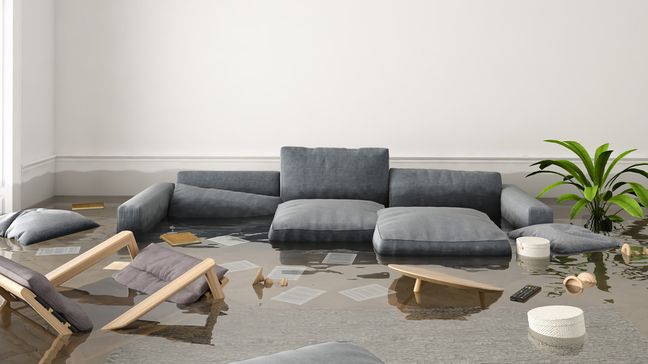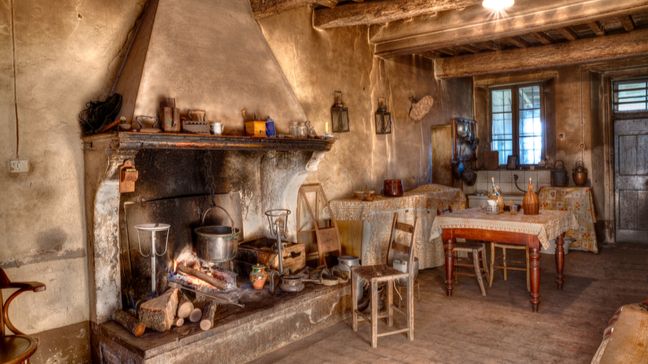When you buy a new home, it’s so important to make sure it’s protected. Theft, fire, even a rogue plumbing accident could cost you thousands of dollars in damage.
That’s why homeowners insurance is a must. But how much is it? The average price of homeowners insurance in the U.S. is $1,211 a year. But the price you’ll actually pay depends on a number of factors — and an important one is where you live.
What is the average homeowners insurance cost in each state?

Homeowners insurance premiums vary widely by state. Your premiums could as much as double just by moving from one state to another.
| State | Average annual premium |
|---|---|
| Alabama | $1,433 |
| Alaska | $959 |
| Arizona | $825 |
| Arkansas | $1,373 |
| California | $1,008 |
| Colorado | $1,495 |
| Connecticut | $1,479 |
| Delaware | $833 |
| District of Columbia | $1,235 |
| Florida | $1,951 |
| Georgia | $1,267 |
| Hawaii | $1,102 |
| Idaho | $730 |
| Illinois | $1,056 |
| Indiana | $1,000 |
| Iowa | $964 |
| Kansas | $1,584 |
| Kentucky | $1,109 |
| Louisiana | $1,968 |
| Maine | $882 |
| Maryland | $1,037 |
| Massachusetts | $1,488 |
| Michigan | $942 |
| Minnesota | $1,348 |
| Mississippi | $1,537 |
| Missouri | $1,285 |
| Montana | $1,174 |
| Nebraska | $1,481 |
| Nevada | $755 |
| New Hampshire | $972 |
| New Jersey | $1,192 |
| New Mexico | $1,017 |
| New York | $1,309 |
| North Carolina | $1,086 |
| North Dakota | $1,253 |
| Ohio | $862 |
| Oklahoma | $1,885 |
| Oregon | $677 |
| Pennsylvania | $931 |
| Rhode Island | $1,551 |
| South Carolina | $1,269 |
| South Dakota | $1,202 |
| Tennessee | $1,196 |
| Texas | $1,893 |
| Utah | $692 |
| Vermont | $918 |
| Virginia | $999 |
| Washington | $854 |
| West Virginia | $940 |
| Wisconsin | $779 |
| Wyoming | $1,156 |
Source: Policygenius.
Insurance premiums are based on many variables, so the state you live in is just one piece of the puzzle. However, if you live in one of the following five states, you can probably expect to pay the highest insurance premiums in the country:
- Louisiana – $1,968.
- Florida – $1,951.
- Texas – $1,893.
- Oklahoma – $1,885.
- Kansas – $1,584.
(It’s probably no coincidence that those are areas subject to hurricanes and tornadoes — unpredictable and destructive forces of nature that can level buildings and towns).
On the other hand, if you live in one of these states, you’re likely to enjoy the lowest average homeowners insurance premiums in the land:
- Oregon – $677.
- Utah – $692.
- Idaho – $730.
- Nevada – $755.
- Wisconsin – $779.
Compare homeowners insurance rates by company
The insurance carrier you select has an effect on your insurance rates as well. The same policy at one carrier could cost 30% more — or 30% less — at a different carrier. So it’s really important to shop around.
Source: Policygenius.
What does homeowners insurance cover?

So what are you getting for those insurance dollars? Peace of mind. Homeowners insurance protects you from a variety of adverse events.
Weather damage
If a punishing hail storm sweeps through your town and damages your roof, you can file a claim to fix it. Or, if lightning strikes the tree overhanging your porch and a huge limb comes crashing through your bedroom window, insurance will help pay for repairs.
Catastrophes
Nobody expects their home to catch fire, but sometimes disaster happens. Your homeowners policy will protect you.
What does homeowners insurance pay for?
Your insurance policy may cover more than you think. Here are some of the things most homeowners insurance policies cover:
Home repair or replacement
The actual structure of your home — the walls, the roof, and so on — is of course protected by your policy. So is your garage, and any other outbuildings, such as a shed. In fact, a good guideline is to have enough insurance that you could rebuild your home if it was necessary.
Replacing your possessions
The things within your home are covered, too. Furniture, fine jewelry, electronics: these are expensive items, and not so easy to replace if your home is burgled or destroyed in a natural disaster (excluding floods).
Your policy covers these, but check on the specific dollar amounts (and purchase an additional rider if you’re dripping with diamonds or furs). Your stuff doesn’t have to be in your house to be covered, either. If your laptop is stolen in a foreign country, it’s still covered.
Accidents
If you accidentally cause harm to another person, homeowners insurance protects you against a lawsuit. So if a neighbor slips and falls on your icy front steps and decides to sue, your homeowners insurance will pay for the cost of legal defense, plus any court awards up to your liability limits.
This insurance protects the homeowner as well as their family members and even their pets. Which is good news if your dog (or your toddler, I guess) is a biter.
Living expenses
If, say, a tornado levels your home, you’ll need somewhere else to live. Additional living expenses coverage pays for hotel rooms and restaurant meals while your home is being rebuilt. Otherwise, paying those costs for months on end would add up very quickly.
What factors dictate how much homeowners insurance costs?

Your premiums depend on a number of different moving parts. A few influences on the price of your premium include:
- How old your house is.
- The city and state it’s located in.
- Fire risk from fireplaces, wooden decks, and multi-car garages.
- The potential cost of a catastrophic event.
If your home is in a “high-risk market,” for instance, in a coastal area at risk of storm surge, then you’ll probably pay more. Same if you live in Tornado Alley (Texas, Oklahoma, etc).
Other influences on price include:
- Replacement costs.
- Deductible amounts.
- Whether you have a pool or a pit bull.
- The condition of the home.
- Your credit score.
- Insurance score.
- Claims history.
How much homeowners insurance coverage do you need?
Deciding how much you need can be a personal decision, but it’s important to make sure that your bases are covered.
First, determine how much it would take to replace the house. This is not the same as what you paid to buy it. That’s because the purchase price included the land. A dwelling replacement cost is just the materials and labor to rebuild it. You can get a ballpark figure by multiplying your square footage times the local average for building costs per square foot (your agent might know this number).
Next, do a quick inventory of your possessions. You don’t need to count every casserole dish: focus on the number and value of your big-ticket items, whether that’s a laptop computer or your engagement ring. Then decide if you want to insure them for their cash value, or for how much it would cost to replace them in the future. Some things will depreciate, so it might cost more to replace them.
Finally, figure out how much liability insurance you need. You might be fine with the standard $100,000, or you might feel more comfortable with twice or even five times that amount.
Where to find homeowners insurance
When you know how much insurance you need, it’s time to shop around for the best carrier. The beauty of the internet is being able to run quotes through sites like Policygenius, which help you narrow down the seemingly infinite options to find what works best for you.
Policygenius
 Policygenius is an independent online insurance broker that helps you sort through the noise when looking for homeowners insurance. They’re not affiliated with one particular carrier; rather, they partner with many different companies so you can compare apples to apples. They’ll even help you evaluate your current policy, if you have one, to see if there’s room for improvement.
Policygenius is an independent online insurance broker that helps you sort through the noise when looking for homeowners insurance. They’re not affiliated with one particular carrier; rather, they partner with many different companies so you can compare apples to apples. They’ll even help you evaluate your current policy, if you have one, to see if there’s room for improvement.
If you have questions, they have experts who can answer them, and they’ll help you with the paperwork, too. To check them out, visit Policygenius and fire up their insurance finder tool. It asks you some simple questions to get you started, such as whether you’re looking for a policy for a new house or your existing house. They’ll also help you figure out whether you can save money by bundling home and auto, even if you already have them separately.
Lemonade
 Lemonade is an insurance company with a different way of doing things: they keep their pricing low and transparent, they pay claims fast (like super fast), and if there’s money left over, they donate to charitable causes. In fact, it’s part of their business model to give back.
Lemonade is an insurance company with a different way of doing things: they keep their pricing low and transparent, they pay claims fast (like super fast), and if there’s money left over, they donate to charitable causes. In fact, it’s part of their business model to give back.
Lemonade homeowner policies start at $25, which is half the price of the lowest state average (remember? That was Oregon at $677/year). Insurance claims are handled by AI in addition to the staff, and you can file claims right from the app. To get your Lemonade quote, you’ll start by providing your name and address and let them know if you’re thinking of switching or if you’re looking for insurance on a new home.
Young Alfred
 Young Alfred is an online, digital insurance broker, with an emphasis on privacy, security, and friendly customer service. You can do everything online and buy a policy instantly if you want.
Young Alfred is an online, digital insurance broker, with an emphasis on privacy, security, and friendly customer service. You can do everything online and buy a policy instantly if you want.
Young Alfred partners with dozens of carriers, and they offer discounts up to 30% if you bundle home and auto.
Check Young Alfred out and see the quotes you’re eligible for by providing name and address, plus your email — they use it to save your progress, but they’ll also send you better quotes if they come along. They’ll show you a cool report about the risk factors for your address (Theft, mold, tornados, and rain are what I need to worry about where I live) and get you started on the quote process. If you like what you see, sign up then and there.
What happens if you don’t have enough homeowners insurance?
If you short yourself on insurance and the worst comes to pass, you could regret it. First of all, if you have a mortgage payment, your lender is probably going to require you to carry insurance on the home. Messing with that could put your home loan in jeopardy or even in default, which will have a major effect on your credit score.
Not having enough insurance is also a risky move because if something does happen, you’ll have to pay for it out-of-pocket. Repairing major damage gets very expensive very quickly. And forget about replacing the home without insurance — unless, that is, you have tens or even hundreds of thousands of dollars laying around. That doesn’t even count the cost to replace all your furniture, clothing, and other possessions if your home is destroyed by a fire or a hurricane.
To give you an idea of how the overall insured amount affects your premium, compare costs for the following coverage amounts on standard homeowners insurance policies.
| Amount insured | Average premium |
|---|---|
| $49,999 and Under | $681 |
| $50,000 to $74,999 | $761 |
| $75,000 to $99,000 | $830 |
| $100,000 to $124,999 | $875 |
| $125,000 to $149,999 | $914 |
| $150,000 to $174,999 | $954 |
| $175,000 to $199,999 | $990 |
| $200,000 to $299,999 | $1,081 |
| $300,000 to $399,000 | $1,242 |
| $400,000 to $499,000 | $1,466 |
| $500,000 and Above | $2,164 |
Source: Policygenius.

If you want the best coverage for the lowest price, there are some tips to try to reduce your premiums.
Bundle home & auto
You may be able to knock off 20% from your insurance policy if you look for discounts, such as bundling your home and auto policies together. Ask your current car insurance company if they offer any deals for bundling. Or, see if you could save by switching your car insurance to your homeowners insurance company. (You may need to do some math to see if changing your auto policy really would net a savings.)
Install safety devices
Insurance carriers love to see you go the extra mile to put in features like security systems and smoke detectors, because it shows you’re taking precautions to protect your investment. They might offer a discount if you do. Some safety features that could bring your price down:
- Deadbolt locks on your doors.
- Smoke detectors.
- Fire extinguishers.
- A sprinkler system.
- A home security system.
Increase your deductible
By agreeing to pay a higher deductible if you need to make a claim, you can often save significantly on your homeowners insurance premiums. Your insurance carrier may have a quote tool that lets you see how much you could save, or you can call the company or ask your agent.
Work your advantage
You may even be eligible for other affiliation discounts, too. For example, you could get a discount for being an alumnus of a certain university or a member of an organization. Check with your insurance company to see what deals or group discounts you qualify for.
Keep your credit score up
Homeowners insurance companies see a good credit score as an indicator that you’re a good investment risk. Keep your credit score up and check your credit report regularly — you don’t want any errors costing you.
Summary
Buying home insurance may seem complicated at first, but it’s a crucial part of protecting your home and belongings. How much you’ll pay will depend on where you live, the condition of your home, and hazards and risk factors you may be exposed to.
Lockdown some discounts before you commit, and definitely compare prices at a few different places. Online brokers are going to go the extra mile to deliver low prices, so if that’s a priority for you, start there.